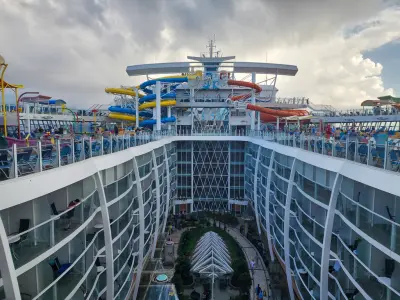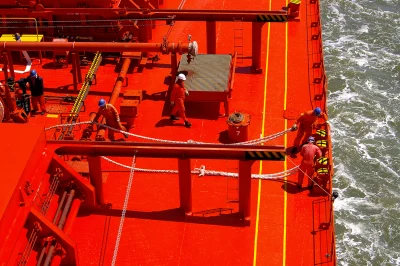Why certifications are necessary
Licensed mariners are trained to perform specific roles that allow a vessel to be operated safely and correctly. Engineers ensure that the ship’s machinery operates as it should. Deck officers are responsible for navigating the ship and checking that all systems are functioning properly, while Radio officers represent a vital link between ship and shore. Together, the master and his officers are responsible for passage planning, safe navigation, cargo loading and discharge, ship stability, communications and the maintenance of all onboard machinery and equipment.
With so many tasks to carry out onboard, maritime crew certifications are pivotal for numerous reasons. They not only validate crew members' competence but also contribute to the overall safety, regulatory compliance and smooth operations of maritime vessels. First and foremost, they are the bedrock of safety. By imparting crucial skills and knowledge, these certifications ensure that crew members can safely operate equipment and respond effectively to emergencies, mitigating accidents and environmental risks.
Fleet owners and operators face the complex challenge of not only aligning the right certifications with the corresponding vessel types but also ensuring that certified crew members are available and present for specific voyages demanding those skills.
The reason behind this meticulous oversight is multifaceted. First, it secures the safety of maritime operations, preventing accidents, injuries and potential loss of life at sea. Secondly, it guarantees compliance with stringent international and national regulations, maintaining the fleet's reputation and integrity. Moreover, it optimises operational efficiency, minimising downtime and operational costs by deploying well-trained and certified personnel. Ultimately, the efficacy of certification management at the fleet level resonates far beyond mere compliance; it is the cornerstone of a safer, more efficient and compliant maritime industry, essential for global trade and transportation.
A simple comparison
Let’s take a further look into the relevance of the type of ship. We can compare, for example, the skill requirements of an officer working on a cruise ship with one working on an LNG Gas Carrier.

Cruise ships
Cruise ships, particularly the massive ocean liners that serve as floating resorts, have an exceptionally complex operational environment that demands a wide range of certifications for their crew members. This is driven by the multifaceted nature of their responsibilities and the diverse services provided onboard.
First and foremost, the safety of the multitude of passengers onboard is paramount. Certifications are required for crew members responsible for passenger safety, encompassing emergency evacuation procedures, operation of life-saving equipment and crowd control during both drills and real emergencies.
Cruise ships are also notable for their complex engineering systems, and engineers onboard must possess certifications related to marine engineering, encompassing steam and gas turbine operation, diesel engine maintenance and electrical systems management.
Environmental compliance is an ever-growing concern, prompting certifications for crew members involved in waste management, emissions control and adherence to international environmental regulations.
Finally, ensuring onboard safety and effective emergency response necessitates certifications related to fire prevention, firefighting, damage control and search and rescue operations. These certifications collectively create a highly specialised and well-prepared workforce, ensuring the comprehensive safety, comfort and regulatory compliance of cruise ship operations.
LNG ships
Crew members serving aboard LNG carriers undertake specialised training and certification programs tailored to the unique challenges of handling liquefied natural gas.
The first set of certifications focuses on LNG operations, equipping crew members with in-depth knowledge of LNG properties and the specific procedures required for its safe handling. Training encompasses safe loading and unloading practices, proper storage techniques and the transportation of LNG. Crew members become proficient in managing the extreme cryogenic temperatures associated with LNG to ensure both cargo integrity and the safety of the vessel.
In tandem with LNG operations, certifications related to cargo containment systems are fundamental. These certifications centre on the critical systems responsible for maintaining LNG at its required low temperatures and preventing leaks or spills. Crew members are well-versed in the operation, meticulous monitoring and regular maintenance of these complex systems.
This expertise ensures the structural integrity of the cargo containment systems and, consequently, the overall safety of the LNG carrier. Additionally, given the hazardous nature of LNG as a flammable and cryogenic cargo, crew members are trained in the safe handling, secure storage and emergency response protocols specific to hazardous cargoes. These comprehensive certifications prepare the crew to react effectively and decisively to potential emergencies or incidents involving LNG.

Challenges and solutions
From the examples given above, it is clear that the correct certification needs to be in place for crew members working different types of vessels. Ship managers face several formidable challenges when consolidating, tracking and ensuring the up-to-date status of certifications for their diverse maritime crew. One of the critical challenges is monitoring certification expiry dates. Overseeing numerous certifications and their renewal timelines for a sizable crew can be logistically demanding, as missing deadlines can lead to non-compliance and legal issues.
Another substantial challenge is staying abreast of evolving maritime regulations. Regulations change, and new certifications may become necessary to meet updated standards, necessitating a keen awareness of industry updates. Additionally, managing certification documents in both digital and paper forms and ensuring their accessibility for verification purposes is a formidable task.
To address these challenges and others effectively, many ship managers are turning to digital document management solutions like LR OneOcean’s Certificate Management, part of our Ship Management solution, which offers a centralised database for certification storage and retrieval, automated notification of certification expiration. By adopting these solutions, ship managers streamline the certification management process, enhancing safety, compliance and operational efficiency in maritime operations. Learn more here.

